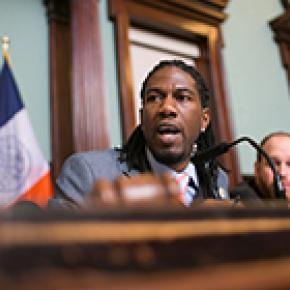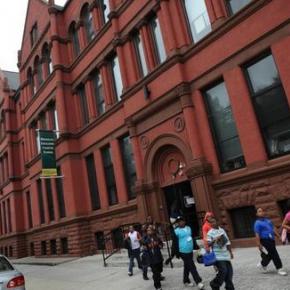Alaska NEA votes to oppose arming teachers
Wuerth, who describes himself as an educator, activist, and writer, was among the teachers who marched with students...
Wuerth, who describes himself as an educator, activist, and writer, was among the teachers who marched with students during the “March for Our Lives” student walkout in March. The notice that was sent about the civil disobedience training that he will teach said that Jennifer Flynn Walker a trainer from Center for Popular Democracy -Director of Mobilization and Advocacy for CPD will also be a trainer and that actions they plan include congressional and senatorial offices.
Read the full article here.
Council Moves to Enhance Voter Registration Through City Agencies
Gotham Gazette - November 24, 2014, by Samar Khurshid - At a hearing Monday, the New York City Council's Committee on...
Gotham Gazette - November 24, 2014, by Samar Khurshid - At a hearing Monday, the New York City Council's Committee on Governmental Operations approved the latest drafts of two bills that enhance the responsibility of city agencies to conduct voter registration and a resolution calling for the State Legislature to pass similar legislation.
These measures are an attempt by the Council to improve the compliance of City agencies with Local Law 29, also known as the Pro-Voter Law, which was passed in 2000. The law requires 19 city agencies to handle voter registration applications for customers.
The new legislation is headed to the full Council for a vote on Tuesday and then, if passed as expected, to the desk of Mayor Bill de Blasio. The bills expand the mandate of the Pro-Voter law to seven additional agencies and create a standard for enforcing the law, including required semi-annual reports from participating agencies. Implementation of the existing law has proven to be a problem, with city agencies failing to uphold their responsibilities to offer registration forms to New Yorkers doing other business with the City.
The accompanying resolution calls upon the State Legislature to augment existing agency-assisted registration laws to include codes on registration forms that would help track agency performance and registration statistics.
Council Member Ben Kallos, chair of what he called the "good government committee," introduced Intro 493 A which expands scope of the Pro-Voter law and sets a deadline of December 1, 2015 for agencies to integrate their forms with voter registration.
The second bill, Intro 356 A, which establishes reporting requirements for the agencies, and the accompanying resolution, were introduced by Council Member Jumaane Williams.
"The last election was abysmal," Williams said of voter turnout in response to questions from Gotham Gazette. Stating that the city and state are falling behind in civic participation, he said, "This should be an issue that all parties - Republicans, Democrats, third parties - every party should be working to increase participation."
The push for increased voter registration began in July with Mayor de Blasio's Directive 1, which ordered agencies under the Pro-Voter law mandate to create plans for implementing the law. Then, in October, the City Council introduced the two new bills in response to a report released by a coalition of good government groups which showed the City's lax compliance with Local Law 29.
According to the report, 84 percent of clients at 14 of these agencies were not provided registration applications when they should have been. Additionally, only 2 out of 5 applicants with limited English proficiency were given translated applications, and agents were not trained in the application process.The report was compiled by the Pro-Voter Law Coalition, comprised of the Center for Popular Democracy (CPD), the Brennan Center for Justice at the NYU School of Law, Citizens Union of the City of New York, and the New York Public Interest Research Group (NYPIRG). Their investigation was aided by the Asian American Legal Defense and Education Fund.
The report's importance is highlighted by the fact that over 30 percent of New Yorkers who were interviewed at the agencies were not registered to vote.
The de Blasio administration initially rejected the two bills over privacy concerns and on the grounds that they came too close on the heels of Directive 1 and wishing to see agencies given more time to comply. Taking those concerns into consideration, changes were made to Williams' bill on reporting mandates. Williams disagreed with the administration but eventually came around to ensure changes were made in the proposal which will protect applicants' information while still allowing the Board of Elections to track registration data from agencies.
"I'm expecting (the) resolution to have a serious impact in Albany," said Council Member Kallos to Gotham Gazette. "Whether it's the Assembly or the Senate, we can all agree that government works better when we measure what its doing and this will take a step towards that."
Representatives of the good government groups that authored the report also testified at the hearing. Steven Carbo, director of Voting Rights and Democracy Initiatives at CPD praised the proposals, asserting, "Likely hundreds of thousands, if not millions of eligible voters were never given the opportunity to register to vote over the years, perpetuating regrettably low rates of voter registration in New York particularly among lower income, of color and immigrant citizens," he said.
Peggy Farber, legislative counsel for Citizens Union, called the proposals "meaningful steps to improve the pro-voter law, to codify the important work of the administration."
On Tuesday, the bills and the resolution will head to the full Council for a vote at the Stated Meeting, where they are very likely to pass.
Source
How Can We Combat Wage Theft And Protect Immigrant Workers?
Every year, millions of workers suffer from wage theft when employers or companies do not pay them what they are owed...
Every year, millions of workers suffer from wage theft when employers or companies do not pay them what they are owed.
Read the full article here.
New York charter school audits reveal $28 million in questionable expenses
New York State charter schools have made more than $28 million in questionable expenditures since 2002, according to a...
New York State charter schools have made more than $28 million in questionable expenditures since 2002, according to a new review of previous audits of the publicly funded, privately run schools.
The Center for Popular Democracy’s analysis charter school audits found investigators uncovered probable financial mismanagement in 95% of the schools they examined.
Kyle Serrette, education director for the progressive group, said the review of previously published audits showed the schools need greater oversight.
“We can’t afford to have a system that fails to cull the fraudulent charter operators from the honest ones,” said Serrette, whose group compiled the report with the non-profit Alliance for Quality Education. “Establishing a charter school oversight system that prevents fraud, waste and mismanagement will attack the root cause of the problem.”
The state controller’s office and state Education Department have audited 62 of New York’s 248 charter schools, according to Serrette’s report. All told, Serrette’s group estimates wasteful spending at charters could cost taxpayers more than $50 million per year.
Eighteen audits targeted charters in New York City, representing about 9% of the 197 charters in the five boroughs. Each audit found issues.
A 2012 audit found Brooklyn Excelsior Charter School was paying $800,000 in excess annual fees to the management company that holds its building’s lease. A 2012 audit of Williamsburg Charter High School revealed school officials overbilled the city for operations and paid contractors for $200,800 in services that should have been provided by the school’s network. A 2007 audit of the Carl C. Icahn Charter School determined the Bronx school spent more than $1,288 on alcohol for staff parties and failed to account for another $102,857 in expenses.The city spends more than $1.29 billion on charters annually.
State Education Department officials and a spokesman for the state controller’s office declined to comment on Serrette’s report.
Northeast Charter School Network CEO Kyle Rosenkrans said the schools already get plenty of oversight because they are subject to audits and must have their charters renewed at least every five years.
“Charter schools are the most accountable public schools there are,” the charter advocate said. “If we don’t perform or we mismanage our finances, we get shut down.
Source: New York Daily News
For Safer City Schools, More Counselors, Fewer Cops
Our city is facing a tough question: how do we make schools safer? New York City schools are on the precipice of...
Our city is facing a tough question: how do we make schools safer?
New York City schools are on the precipice of returning to ineffective policies and practices like more policing and metal detectors that have harmed the students who are most in need. The city could and should instead take this opportunity to move further towards school culture and climate priorities that are designed to meet the social, emotional, and mental health needs of young people.
Read the full article here.
Simplify Investments to Keep Them Clean
New York Times - May 11, 2014, Room for Debate: Connie Razza - Public pensions are under threat from outright fraud as...
New York Times - May 11, 2014, Room for Debate: Connie Razza - Public pensions are under threat from outright fraud as well as the financial sector’s drive to generate higher profits for itself, regardless of the cost to our communities. The public can take simple steps to eliminate this danger. Investments should be put in index funds, which typically outperform actively managed portfolios. A recent comprehensive study of the performance of state pension funds found that the 46 state funds studied could save $6 billion in fees annually, while achieving returns as good or better than their actively managed portfolios. Most privately managed pensions already pursue indexing strategies, through vehicles like Amalgamated Bank’s LongView Funds, and successfully secure strong retirement savings for participants. Public pension funds should index a significant portion of their funds under management to save billions while still generating first-rate returns.
Index funds outperform managed portfolios. Relying on them would save on fees and avoid underhanded behavior.
These funds would also save significant amounts in management fees by hiring talented in-house investment managers for significant portions of actively managed pension assets.
Any investment should be presented in plain language in a standardized, easy-to-read template, so trustees and pension participants know exactly what the product does, how it makes money and what its fees and risks are. Like cell phone agreements, all fees should be disclosed up front. Like credit card bills, actual returns and long-term, historical performance should be clearly presented. Oversight of fiduciaries should be bolstered and any who violate their responsibility to retirement funds should be pursued legally. When the State Employees Association of North Carolina hired a pension forensic investigator, they found that the state treasurer Janet Cowell had invested $30 billion in illegal, high-risk funds, causing $6.8 billion in losses. A more robust standing oversight body could have prevented much of that improper investment. The state should aggressively prosecute both pension trustees and private investment managers who put their own benefit above the interest of pension participants. More eyes on the management of retirement assets would help ensure responsible investment strategies and management. Creating a publicly managed pool of retirement funds would invest more residents in pension management, while ensuring that fewer workers would find themselves insecure in retirement. And, increased pension funds make possible more diverse, responsible investments for the actively managed portions of the funds. For instance, funds can take a decisive role in infrastructure investments that will both improve their communities and provide steady, long-term returns.
Source
Yellen, Departing Fed, Will Join Brookings
Fed Up, a coalition of unions and community groups, said it would deliver a giant “Thank You” card to the Fed on Friday...
Fed Up, a coalition of unions and community groups, said it would deliver a giant “Thank You” card to the Fed on Friday afternoon to celebrate Ms. Yellen’s success in reducing unemployment.
Read the full article here.
Protester shouts at Sen. Jeff Flake in elevator: ‘Tell me it doesn’t matter’

Protester shouts at Sen. Jeff Flake in elevator: ‘Tell me it doesn’t matter’
A protester who said she was sexually assaulted approached Senator Jeff Flake in an elevator Friday after he released a...
A protester who said she was sexually assaulted approached Senator Jeff Flake in an elevator Friday after he released a statement saying he would be voting in favor of Brett Kavanaugh for a seat on the Supreme Court.
Read the article and watch the video here.
NY Democrats Seek Citizen Rights for Illegal Immigrants
New York Post - September 15, 2014, by Carl Campanile - Illegal aliens in New York could score billions in Medicaid...
New York Post - September 15, 2014, by Carl Campanile - Illegal aliens in New York could score billions in Medicaid and college-tuition money — along with driver’s licenses, voting rights and even the ability to run for office — if Democrats win control of the state Senate in November, the Post has learned.
A little-known bill, dubbed “New York is Home,” would offer the most sweeping amnesty available anywhere in the country to nearly 3 million noncitizens living in the Empire State.
It would bar police from releasing any information about them to the feds, unless it involves a criminal warrant unrelated to their immigration status.
Under the proposed legislation, undocumented immigrants could also apply for professional licenses and serve on juries.
The plan hinges on Democrats — who now control both the governorship and the state Assembly — wresting control of the Senate from Republicans, who oppose immigration amnesty.
Bronx Sen. Gustavo Rivera, who is sponsoring the legislation in the upper chamber, said he thinks the bill would be in position to be passed “if we have a stable Democratic majority in the Senate.”
He also likened his measure to the campaigns to legalize same-sex marriage and medical marijuana.
“It’s something I believe in,” Rivera said Sunday night. “It’s something the state can do and should do.
Democratic Brooklyn Assemblyman Karim Camara, the chief Assembly sponsor, agreed that taking the Senate was key, saying “The bill would have a better shot at passing with a Democratic Senate.”
“I look forward [to] having a robust conversation about how significant this bill is.”
But the GOP plans on using the proposal to warn voters how radical New York would become if Democrats take charge.
Republicans are already referring to it as the “illegal immigrants benefits legislation” and will make the bill their poster child in elections in more conservative upstate and suburban districts.
“This bill could pass if the Democrats are in charge of the Senate. They’re out of their minds,” said Sen. Marty Golden (R-Brooklyn).
“This is astounding. This undermines our nation’s immigration laws and procedures.”
Said state Conservative Party chairman Mike Long: “This is absolutely amnesty. It disregards the laws of the United States. It’s unconscionable,” Long added.
The bill was introduced during the waning days of the legislative session in June, and is backed by immigrant-rights groups including Make the Road New York, the Center for Popular Democracy, and La Fuente.
GOP officials maintain that amnesty for illegal aliens would open the door to fraud and abuse and increase the risk of terrorism.
For example, the bill would let illegals vote in local and state elections, but they would be barred by federal law from voting for presidential or congressional candidates.
Mayor de Blasio pushed through a new city law that created a municipal ID card that provides some benefits to noncitizens.
Camara, chairman of the New York State Black, Latino and Asian Caucus, insisted that only immigrants who prove they have been living productively would get benefits under his bill.
They would also have to show that they have been living in New York for at least three years and have paid taxes to the state.
Source
Activists Face Rain And Security Threats As 10-Day March Against White Supremacy Continues

Activists Face Rain And Security Threats As 10-Day March Against White Supremacy Continues
Braving the rain, threats of violence and uncertainty over police permits, dozens of civil rights activists set out on...
Braving the rain, threats of violence and uncertainty over police permits, dozens of civil rights activists set out on the sixth day of their 118-mile trek from Charlottesville, Virginia, to Washington, D.C., on Saturday to protest the white supremacist ideas that inspired deadly violence in Charlottesville a few weeks ago.
The 10-day journey, which organizers from progressive and faith organizations are calling a “March to Confront White Supremacy,” began on Monday with a rally in Charlottesville’s Emancipation Park and is due to conclude this coming Wednesday with nonviolent civil disobedience in the nation’s capital.
Read the full article here.











2 months ago
2 months ago